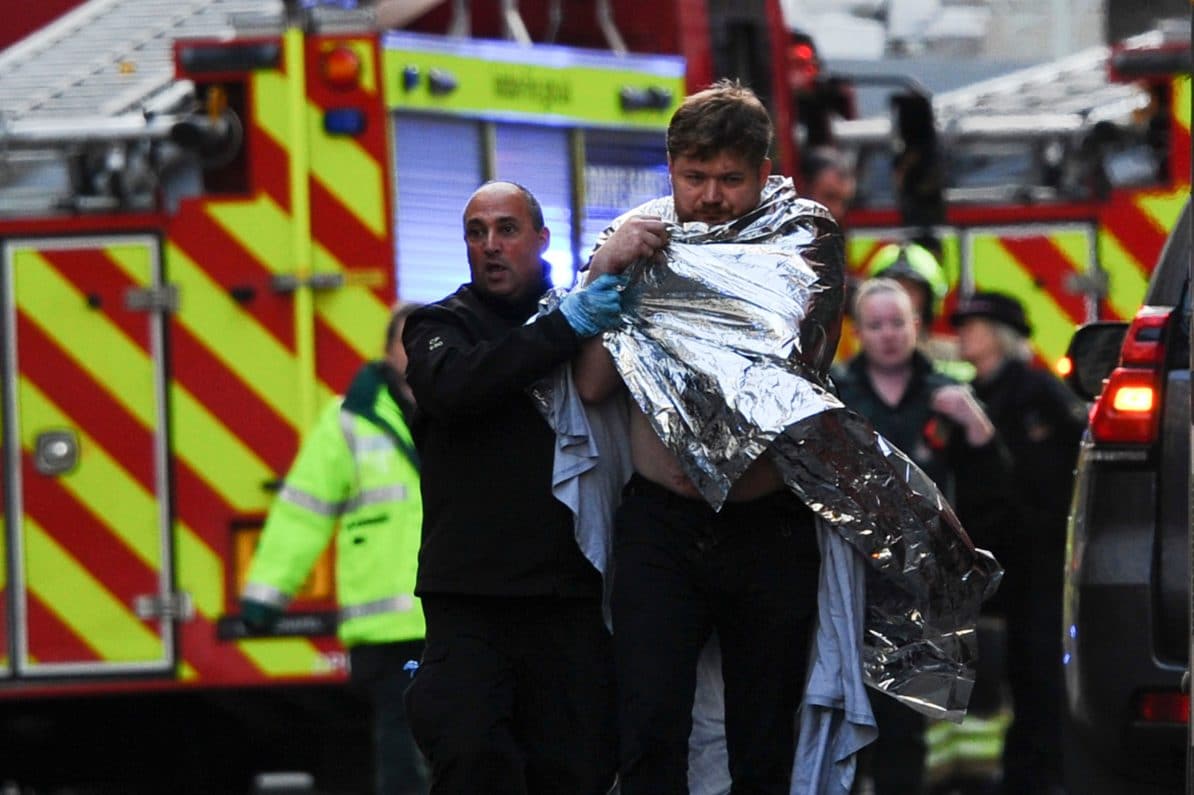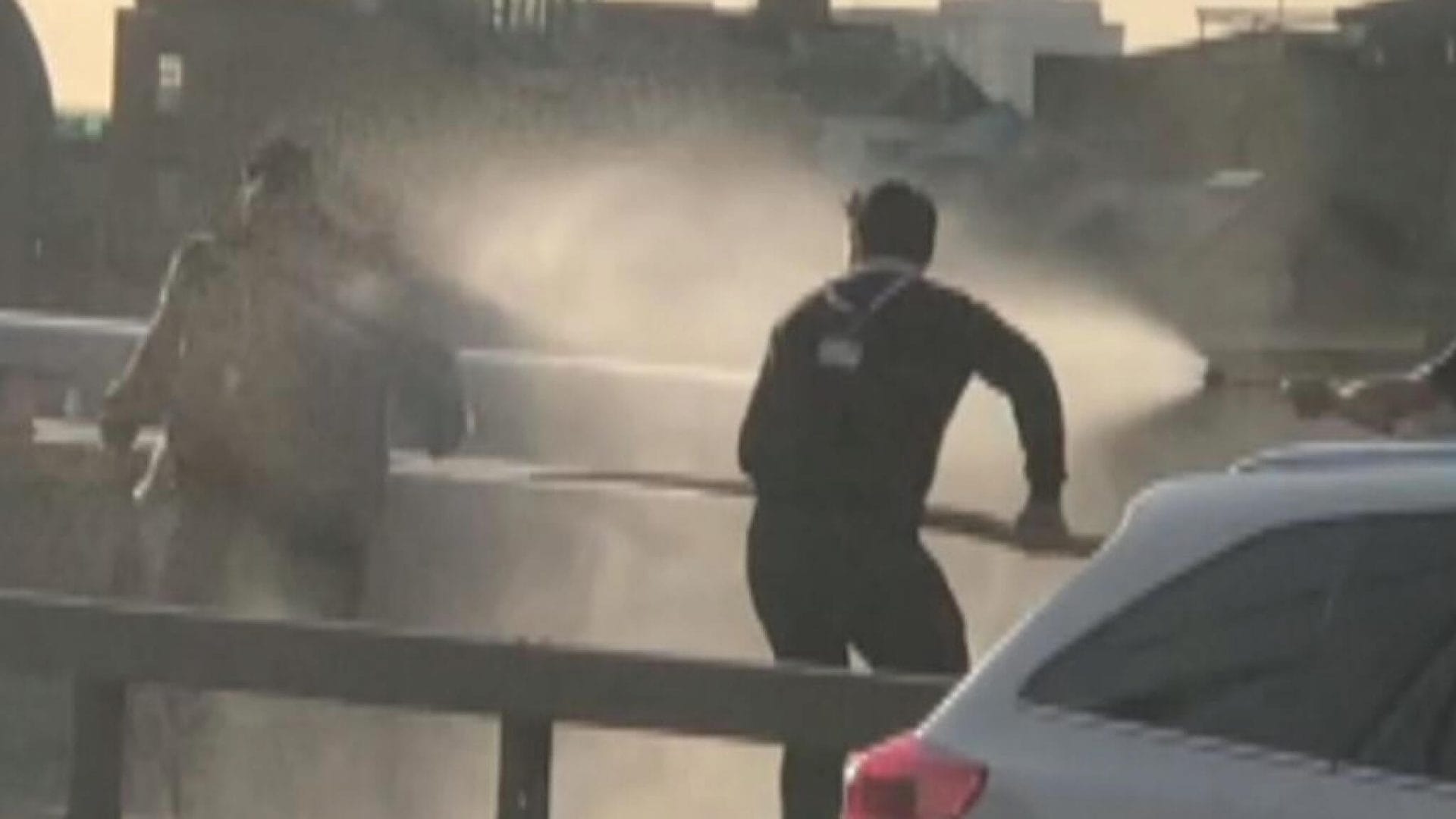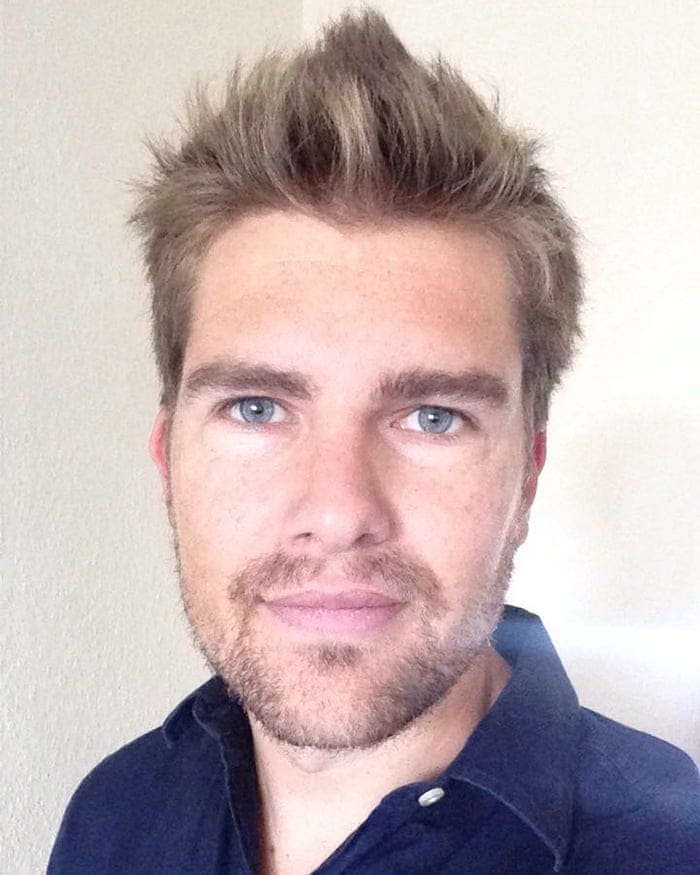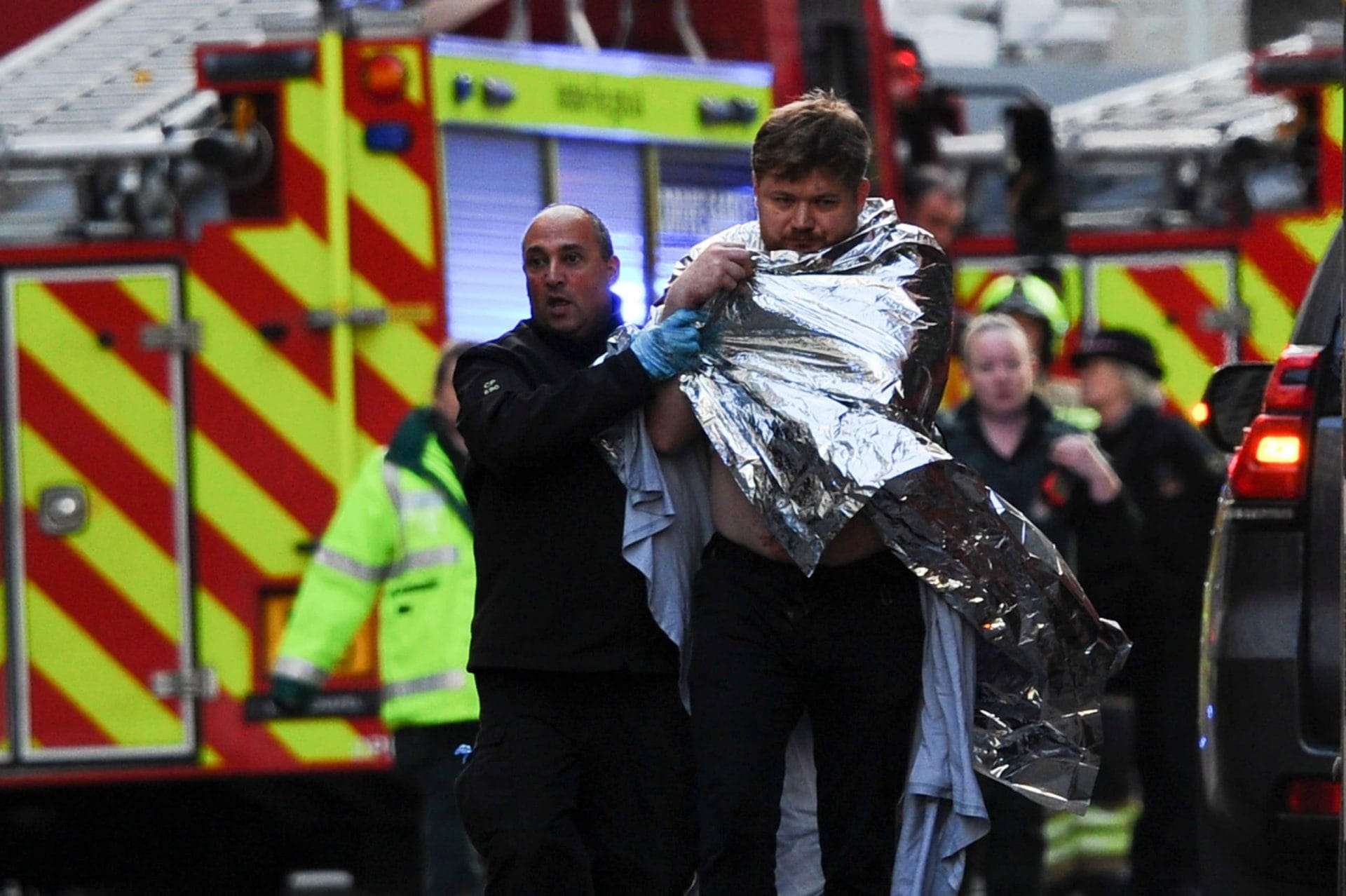Moment that mattered: The London Bridge terror attack
On 29th November 2019 Darryn Frost bravely tackled a terrorist on London Bridge with a narwhal tusk. Three months later he spoke to Delayed Gratification about the emotional effects of that day, the dangers of misreporting and the incredible offer he has made to one of the convicted murderer who fought alongside him

29th November 2019 (Taken from: #37)
On 29th November 28-year-old Usman Khan was attending the Learning Together conference on criminal justice at the Fishmongers’ Hall by London Bridge. At 1.55pm he emerged from the toilets wearing a fake suicide vest and with knives taped to his hands.
In the ten minutes that followed he carried out a vicious attack on fellow delegates in which five people were stabbed, two of them fatally, before he was shot dead by armed police officers.
Khan, a convicted terrorist who had been released from prison 11 months earlier, had spoken at the event about his apparent rehabilitation, yet hours later killed Jack Merritt, a 25-year-old who had worked with him, and Saskia Jones, a 23-year-old volunteer at Learning Together. More people might well have died had it not been for the actions of a group of fellow attendees who tackled Khan and pinned him to the ground until the police arrived.
Darryn Frost was one of those to take action, confronting Khan and helping to end his rampage. But while he has been widely heralded as a hero, the 38-year-old civil servant has been struggling to deal with the events of that day. “I’ve been in a really bad place,” he says three months after the attack. “I keep getting flashbacks, and keep asking questions over the waste of such brilliant, remarkable lives. There are a lot of things that will always stay with me, and I’ve just got to get used to the new normal of who I am now.”
Frost was in an upstairs room at Fishmongers’ Hall when Khan began his attack. Arming himself with one of a pair of ornamental narwhal tusks that was hanging on the wall, he headed downstairs where he saw Khan – who had just attacked Polish kitchen worker Lukasz Koczocik – being confronted by Steve Gallant. Gallant, a convicted murderer who was attending the conference on day release from prison, was attempting to keep Khan at bay with a chair. “I put the narwhal tusk right into Khan’s belly and he stopped,” says Frost. “Then someone behind me said, ‘He’s got a bomb.’” In the ensuing confusion Gallant threw the chair at Khan, leaving himself unarmed. Frost passed him the tusk and raced upstairs to fetch the other one. “People were coming out of the conference room and they tried to prevent me from going back down,” he says. “I said, ‘I’m not having any of this,’ took the second narwhal tusk from the wall and went back.

Darryn Frost tackling Usman Khan on London Bridge with a narwhal tusk (Photo courtesy of Extinguish Hate)
There he found the first tusk shattered and an unarmed Gallant chasing Khan out onto London Bridge. Frost followed and he, Gallant and fellow conference attendee John Crilly – a man convicted of murder in 2005 but released in 2018 – confronted Khan once more. “Khan was going towards the public and we had to stop him,” says Frost. “We had to prevent him from causing further injury or taking more lives.” The three men put themselves between Khan and others on London Bridge. “When he saw that he couldn’t catch anyone else, he turned around and came straight back towards me with both knives raised,” says Frost. “It was like a movie where time slows down. I stabbed him in the abdomen and he went down slightly. Then John let off a fire extinguisher. The two things somehow were perfectly timed to disguise Steve who managed to get behind Khan, grab his left shoulder and pull him down.”
Despite still believing Khan was wearing an explosive vest, Frost jumped on his back and held both of his wrists until armed police arrived, yanked Frost off Khan and, believing he was about to trigger the suicide vest, delivered the fatal shot. The explosive device was later discovered to be a fake.
“I said, ‘I’m not having any of this,’ took the second narwhal tusk from the wall and went back.”
The actions of Frost and the two other men were captured on smartphone footage shot by bystanders, which soon spread online along with reports on what had happened. Many of these news stories would prove to be inaccurate. A number of national media outlets identified James Ford – who was given a life sentence in 2004 for the murder of 21-year-old Amanda Champion and was also at the conference on day release – as one of the men who tackled Khan alongside Frost on London Bridge. Frost says that this is incorrect and that the impact of such rushed reporting needs to be carefully considered. “I was so angry,” he says. “They misidentified Ford and then went and contacted the family of his victim, who gave an emotional response saying that he should never be called a hero. It was wrong on so many levels. I really feel for that family who had to relive their trauma again. And Ford received death threats in prison. All because of this grabbing at the news.”

Tributes to Cambridge University graduates Jack Merritt, 25, and Saskia Jones, 23, on London Bridge 2nd December 2019. (Photo by: Rick Findler/PA Wire/PA Images)
In the rush to publish information other mistakes were made and Lukasz Koczocik was named as the man who used the tusk on the bridge. Lukasz had tackled Khan and was injured in the process, but inside Fisherman’s Hall, away from the smartphone cameras. Frost was initially happy to let it go. “I had the opportunity to say, ‘No, that was me,’ but I saw such an outpouring of love towards Lukasz that I felt that if I come out now it’ll just be vanity. I don’t need that. What we do need is a lot more compassion. A lot of people from Poland receive a lot of unnecessary hate, and so I saw the positives coming from it. A few days later the police let me know that Lukasz had told them that it was not him.”
“I’ve been deeply disappointed to see the story of what happened on London Bridge being used to spread fear and hate”
In February Frost and Koczocik returned to Fishmonger’s Hall to talk through their experiences. “The press thinking it was Lukasz had an unexpected benefit for me, but came at a cost to him,” says Frost. “Lukasz had the press camped outside of his house. It sounds like a nightmare for him as he’s a private individual who was suffering from injuries and trauma. I, meanwhile, had time to heal away from all the attention. When I met him, he thanked me for saving his life and said, ‘I’m really sorry. I didn’t try and take the credit.’ It doesn’t matter who held the tusk, who was in the video. Lukasz is a hero and he deserves every bit of credit he can possibly receive.”

Darryn Frost (Photo courtesy of Extinguish Hate)
As politicians, the press and the public attempted to make sense of Khan’s actions, the focus fell on the fact that he had been jailed in 2012 for al-Qaeda-inspired terrorism offences and was released in 2018, halfway through his sentence. The government swiftly announced plans for emergency legislation that would prevent the early release of terrorism offenders without parole-board risk assessments. These calls were reiterated and amplified following an attack by another convicted terrorist who had recently been released halfway through his sentence, in London on 2nd February 2020. Sudesh Amman was shot dead by police after stabbing two people on Streatham High Road in what authorities believe to be an Islamist terror incident. The legislation, ending the automatic early release from prison of both current and future terror offenders, passed the Commons unopposed in February 2020.
Frost, who works at the Ministry of Justice, addresses the topic with caution. “There are going to be some really important questions about how we treat people in prisons,” he says. “Do we have the resources available? Can we afford to implement the new laws or do we just make things worse? Are we kicking problems into the long grass and risking a bigger snake coming out the other end? Those are the kinds of questions that I hope are taken into consideration.”

Police assist an injured man near London Bridge in London, on November 29, 2019. (Photo by DANIEL SORABJI / AFP) (Photo by DANIEL SORABJI/AFP via Getty Images)
For his part, Frost is attempting to turn his experiences into something positive. He has launched Extinguish Hate, a campaign to promote kindness as an antidote to extremism. “I’ve been deeply disappointed to see the story of what happened on London Bridge being used to spread fear and hate,” he says. “This only increases intolerance and division, which plays into the hands of terrorist organisations. Extinguish Hate is still taking shape, but the ethos is to look at pragmatic, responsive solutions to terror threats.”
I don’t want to just preach rehabilitation, I want to act on it,”
Frost is putting his beliefs into action, inviting Gallant – the convicted murder who helped him tackle Khan – to come and live with him as part of his parole application. “I don’t want to just preach rehabilitation, I want to act on it,” he says. “I’ve got an opportunity to do that with someone I fought side by side with in the most harrowing of situations.” Frost is determined that Khan’s actions shouldn’t undermine the work of Learning Together and the rehabilitation efforts that Jack Merritt and Saskia Jones believed in. “Gallant tackled an armed man with his bare hands to save the lives of others,” he says. “If that isn’t enough evidence of rehabilitation for me, I don’t know what would be.”
You can read more about Extinguish Hate here
Slow Journalism in your inbox, plus infographics, offers and more: sign up for the free DG newsletter. Sign me up
Thanks for signing up.








